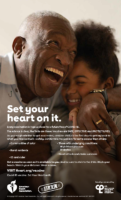With some hope on the horizon in the fight against COVID-19, the American Heart Association, the leading voluntary organization devoted to longer, healthier lives, and CPL, say it’s a good time to stop and take stock of your overall health and wellbeing. That means connecting with your doctor to schedule any check-ups you may have missed in the past year and to manage any conditions you may have like high blood pressure or diabetes. And while you’re taking charge of your health, getting vaccinated against COVID-19 is one of the most important things you can do to protect yourself and your loved ones from the novel coronavirus that has now killed more than half a million Americans.
At least 27.7% of New York residents reported delaying or not getting medical care in the past four weeks because of the pandemic, according to the CDC’s latest Household Pulse Survey of 63,231 adults in the U.S. conducted between March 17th and March 29th. The survey serves as is yet another indicator of how the pandemic may be negatively impacting people’s future health.
“In the year since the pandemic was first declared, we’ve seen some concerning trends. People have been hesitant or unable to get in to see their health care providers. That’s been the case for urgent issues like heart attack and stroke symptoms, and for routine physicals or health check-ups to manage conditions like high blood pressure, diabetes and heart disease,” said American Heart Association Executive Director Marc Natale. “Also, during the year-long quarantine and isolation, stress has become a part of everyday life. Many people have taken up unhealthy behaviors such as lack of exercise, overeating/poor diets and increased alcohol and tobacco use. In the long-run those lifestyle changes can increase your risk for heart disease and stroke.”

Heart disease and stroke risk factors can also be bad news if you get COVID-19. A recent scientific study, published in the Journal of the American Heart Association, found that obesity, high blood pressure, diabetes and heart failure were four of the top risks for COVID-19 complications. Some very severe and long-lasting complications from COVID itself have been heart- and brain-related.
Natale said working with your doctor is the best way to modify or manage your risks for heart disease and stroke through lifestyle changes or by medications. While managing underlying conditions and risk factors helps reduce the risk of severe or deadly COVID complications, the number one way for people at high-risk and for all adults to protect themselves and their loved ones from COVID-19 is to get the vaccine.
“The American Heart Association is encouraging everyone to get a vaccine when it’s their turn to help the Rochester Region get back to normal. CPL is a proud supporter of the Association’s new “It’s Up to You” initiative,” said Todd Liebert, CEO of CPL. “Part of a national push, locally this initiative will focus on providing vaccine information and encouraging everyone to get vaccinated.”
“It’s OK to take whichever vaccine is available to you, as soon as it’s available to you,” Natale said. “Studies have shown the vaccines are safe and effective for all adults. That includes people with existing medical conditions like heart disease as well as for people of color, all of whom were part of the large participant groups in the vigorous scientific research conducted to test the vaccines.”
Scientific research shows Black, Latino and Native American people and those living in rural areas are experiencing disproportionately higher rates of COVID-19 and more severe complications, including heart issues and even death. People in these communities are more likely to have underlying health conditions such as high blood pressure, diabetes, heart disease and obesity, are more likely to work essential jobs limiting their ability to socially distance and are less likely to have access to quality health care.
Natale said health care professionals have plans to keep you and medical staff safe even during a pandemic. But if you are uncomfortable or unable to visit your doctor’s office in-person, there are still ways you can connect. Telemedicine can offer an alternative to skipping those important check-ins and check-ups. Video chats through platforms like FaceTime or Zoom can connect you and your doctor face-to-face and voice-to-voice for a personalized visit. And there are many new options for equipment that make home testing and monitoring easy and convenient to help you and your doctor track your progress.
To learn more about how you can get healthy, stay healthy and protect you and your family from COVID-19, visit www.heart.org/pandemic.
